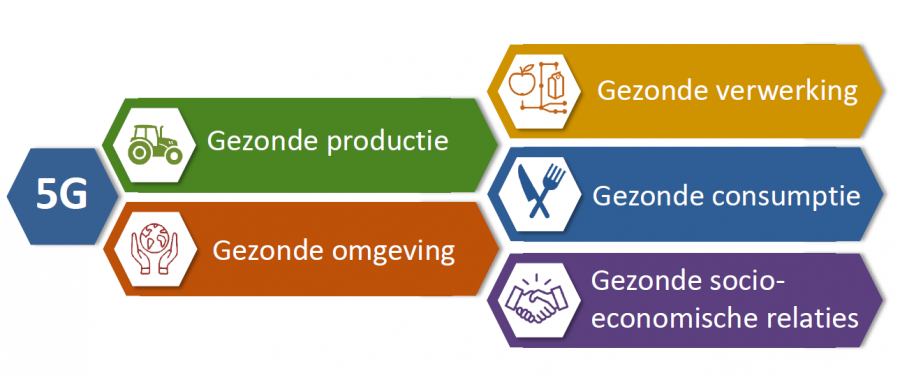Press release 5G in agriculture and food: Five x Gezondheid (HEALTH) as a beacon for ILVO research

ILVO is gearing up its integrated research for agriculture, fisheries and food. In the renewed research strategy that is currently being elaborated, the research institute places its research efforts under the heading of “5G” (5 x “Gezondheid” or Health) of the agrifood system:
- healthy primary production (and fishing)
- healthy food processing,
- healthy socio-economic relationships,
- healthy consumption patterns
- and a healthy environment.
"We are in the middle of a health crisis. The ambition is to work on a systemic health of the agrifood chain within our own field of research".
Healthy production
Healthy production' includes a number of innovative research lines in which ILVO has already invested heavily in recent years:
- protein diversification (new crops such as Flemish soy)
- reduction of plant protection products through increased knowledge of plant pathogens
- climate-friendly agriculture and marine production
- reduced use of antibiotics and improved health and welfare in animal husbandry
- the transition to a circular bio-based economy
- Attention to by-products and residual flows
Healthy processing of food
Food processing companies and home-processors will immediately recognize ILVO’s expertise in terms of food safety (pathogens, spoilage, disinfection...) under 'healthy processing'. But also which food will be produced and processed in the future requires research and development. In protein diversification, society and the sectors can expect a great deal of innovation and knowledge building, certainly also technologically and surrounded by open and shared data systems. The fact that ILVO is also developing research programs on the allergenicity of food, nutritional values, health-promoting properties and anti-nutritional factors of various nutrients (in different stages of processing) is even less well known to the outside world.
Healthy consumption
With 'healthy consumption' ILVO aims at holistic knowledge building: a total diet that is healthy for the person and the planet. There will be a new line of research that focuses on the relationship between intestinal flora and nutrition. Problems such as malnutrition and nutrition for specific target groups (care sector, Parkinson's, sarcopenia, athletes,...) or the reduction of sugar, fat or salt in food will also be addressed by ILVO. To this end, food companies can collaborate with the Food Pilot of ILVO and Flanders' FOOD.
Healthy socio-economic relationships
In the chapter 'healthy socio-economic relationships', ILVO research into alternative earning models and the short chain stands out. As a living lab, a structural collaboration has been set up with six short chain farms, where experiments and scientific observations can take place. The well-being of farmers and their families is also discussed extensively.
Healthy environment
Finally, a 'healthy environment' is given a prominent place. Healthy soil is a priority area. Soil health is good for the farmer, for the climate (carbon storage) and for biodiversity. In this respect, ILVO is starting interesting farm-based experiments: through a structural collaboration with a 50-acre farm that works entirely using agro-ecological principles, new cultivation approaches can be studied for their value and feasibility.
The reduction of emissions is a second knowledge domain that has already been strongly developed. It is a difficult area to investigate, where methodological, technological and biostatistical approaches have to tackle the many uncertainties and subjective aspects.
Conclusion: step by step, concrete, action
ILVO has long supported the following objectives in its agricultural research:
- better soil health
- improving animal health and welfare in an integrated way
- closing nutrient cycles
- pursue higher biodiversity, and use it in farm management
- reducing external chemical inputs
- strengthening farm resilience and autonomy
- strengthening the quality of life in rural areas and the link between producers and consumers
- the pursuit of co-creative research
Joris Relaes: "Nobody can be against this. Yet these are the 8 principles of agro-ecology. The concept has gotten shoved into a polarized discussion around the ideal form of agriculture in 2050. ILVO does not want to remain stuck in an endless discussion. Instead we actually get to work to find science-based improvements. In times of corona, it has become perfectly clear that diversity is important. That we need all forms of agriculture. ILVO supports that with research results that are relevant in practice, and with the people who are active in the field".
The text of the new ILVO future strategy is expected in the autumn of 2020.